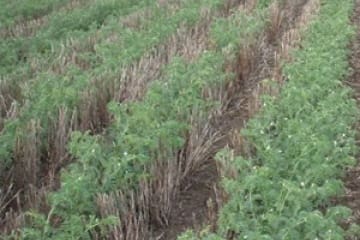SCIENTISTS from the United Kingdom and Africa are seeking to develop chickpeas that can flourish in dry climates, to help some of the world’s poorest farmers reliably grow the staple crop.
 Experts are to use low-cost imaging and computing science techniques to identify how to speed the breeding of chickpea varieties that give high yields in arid conditions.
Experts are to use low-cost imaging and computing science techniques to identify how to speed the breeding of chickpea varieties that give high yields in arid conditions.
Their research could enable farmers in Africa – where much of the population relies on poor smallholdings for subsistence – to improve chickpea harvests in a changing climate.
Researchers hope their findings can significantly improve annual yields from current levels of about 1.5 tonnes per hectare to about 5t/ha.
Chickpeas grown in Ethiopia depend on monsoon rain for their development, but this has been unreliable in recent years, affecting harvests.
Researchers will grow varieties of chickpea plants under a range of conditions in simple transparent frames. Images of the plants’ developing root systems – which show how well these reach into deep soil – will be analysed by artificially intelligent computers.
An interdisciplinary team of scientists will seek to gain a deeper understanding of how conditions affect chickpea growth. They will develop algorithms to determine how a resilient variety could be bred. This will enable breeders to focus on varieties with improved performance.
Experts from the University of Edinburgh, Scotland, will work with Addis Ababa University, the Ethiopian Institute for Agricultural Research and the Ethiopian Biotechnology Institute on the £750,000 project, funded by the Global Challenges Research Fund from the Biotechnology and Biological Sciences Research Council.
The collaboration seeks to build on the University of Edinburgh’s expertise in plant root science and machine learning.
The team hopes the findings from their 30-month study may also benefit chickpea farmers in the Middle East, India and Pakistan, where climates are becoming hotter and drier.
Dr Peter Doerner, of the University of Edinburgh’s School of Biological Sciences, who is taking part in the study, said: “Growing this staple food is already a challenge in many poor regions, and is becoming tougher amid climate change. A chickpea that grows well in dry climates could aid many of the world’s poorest farmers.”
Source: University of Edinburgh

HAVE YOUR SAY